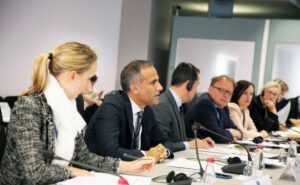
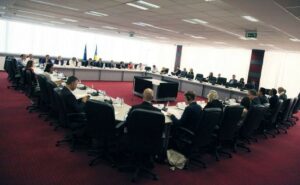
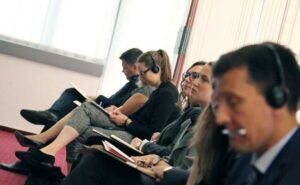
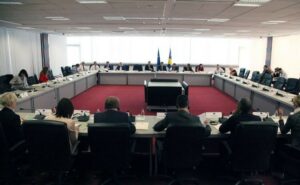
Pristina, 19 September 2018 – The European Commission representatives and Kosovo Institutions held the 2nd SAA Sub-Committee on Economy, Financial Issues and Statistics on 19 of September 2018 in Pristina. The meeting focused on the economy, financial issues, statistics and financial control. The discussion was held in the framework of the Stabilisation and Association Agreement (SAA), which entered into force in April 2016. In all areas, the Commission and Kosovo agreed on the importance of implementing the relevant European Reform Agenda and Economic Reform Program priorities as well as the recommendations from the Commission’s Report on Kosovo.
The Commission and Kosovo Government representatives discussed a number of policy areas, including Kosovo’s macro-economic development, fiscal and financial policies, structural reforms and private sector development, the statistical system and financial control. Initially, the Commission stressed the importance of implementing the recently adopted Joint Conclusions on the 2018-2020 Economic Reform Programmes.
In the area of economic and fiscal policies, the key economic developments were discussed including GDP growth, inflation, the labour market and the external competitiveness. While Kosovo’s economic growth held-up well in 2017, 3.7% of GDP, the projected continuous acceleration of Kosovo’s GDP growth above the historical average deserves a closer look. The EC called to take better into account the global economic trends, particularly growth outlook in the EU, which could have repercussions for a small economy like Kosovo. High trade imbalances and the reliance on the inflow of worker remittances make the economy vulnerable to changes in external environment. Kosovo also needs to strengthen its production base, in order to benefit fully from the SAA.
The Government presented the outlook for fiscal policies, reflecting the projections of the Medium Term Expenditure Framework (MTEF). The EU side urged to finalise the overdue reform in the scheme of war-related benefits and expressed its strong reservations about the currently discussed model of pensions for teachers in the period before 1999 as well as other non-contributory initiatives. The EU side underlined its support to the reform of the public administration in Kosovo, however, stressed the importance of containing the cost of the reform in order to preserve fiscal sustainability and address outstanding inequalities. In this context, the Commission recalled the need of preserving macro-fiscal stability by respecting the spending and deficit limits prescribed by fiscal rules.
The Institutions presented the state of play of key structural reforms in sectors such as health, public administration, pension reform and privatisation. As regards pension reform, Kosovo side shared their plans on adopting a comprehensive new law on state funded pensions, following the review of all existing pension schemes and new specific category-targeting initiatives, which was welcomed by the EU side. The Commission took note of the progress made on other structural reforms, but stressed the need to address pressing issues, such as situation in labour market, widespread informality, rule of law, energy supply are the areas where further reform efforts are needed. The EU side underlined that fostering private sector development, strengthening productivity and creating jobs should guide Kosovo’s reform agenda.
In the area of statistics, the Commission pointed to the need to adopt the amendments to the Law on Statistics by ensuring the professional independence of the Kosovo Agency of Statistics (KAS). The resource situation for production of Official Statistics in Kosovo was discussed also in view of data requirements and their timeliness. The discussion also focused on the requirement to strengthen national accounts, and for this purpose also business statistics. Efficient collection and publication of statistics is a priority for evidence-based policy. The Commission underlined the need to pursue the necessary preparations for Census 2021, especially related to methodology and allocating necessary funding.
In the area of Financial Control, the recent developments in the Public Internal Financial Control were discussed. It was pointed out that attention should be paid to ensuring a comprehensive of Public Internal Financial Control and Public Finance Management and Public Administration Reforms. The Commission underlined the need of ensuring a more systematic follow-up and timely implementation of the external audit recommendations.
The meeting was co-chaired by the Ministry for European Integration and the European Commission Directorates-General for Economic and Financial Affairs, and the one on Neighbourhood and Enlargement Negotiations.
Background information
– The Stabilisation and Association Agreement is the framework for the EU and the Kosovo administration to regularly discuss technical and policy issues in relation to the European agenda.
– SA Committee and Sub-Committee meetings are co-chaired by the European Commission and Kosovo. Each meeting results in jointly agreed follow-up actions to be taken by the Kosovo Institutions. The conclusions from the meetings are available on the website of the EU Office in Kosovo (https://eeas.europa.eu/delegations/kosovo_en and www. https://www.mei-ks.net.). There are seven areas covered through sectorial meetings of sub-Committees, on Justice, Freedom and Security; Innovation, Information Society, Social Policy, Education and Culture; Trade, Industry, Customs and Taxation; Internal Market, Competition, Consumer and Health Protection; Agriculture, Fisheries, Forestry, Food Safety; Transport, Environment, Energy, Regional Development; Economic and Financial Issues, Statistics. Two Special Groups cover the reform of the public administration and normalisation of relations with Serbia.
– Each sub-Committee meeting monitors and accompanies Kosovo’s delivery on reforms and identifies how the EU can assist in this process. The meetings also provide direct input into the European Commission’s annual reports.
Last modified: August 8, 2022
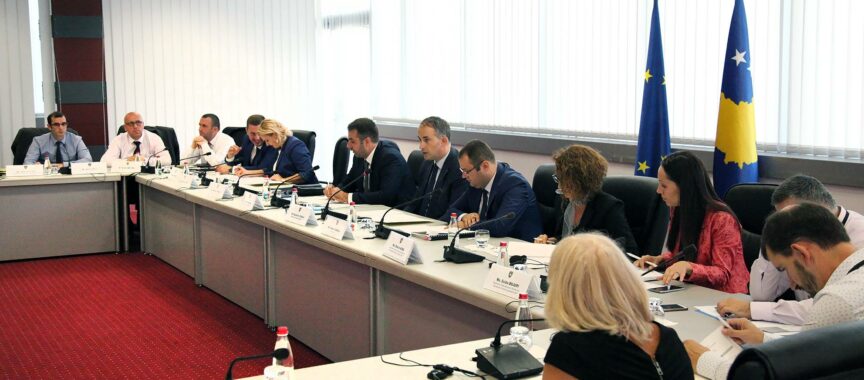
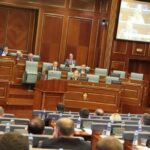
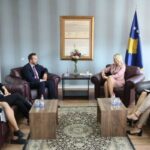








I appreciate you sharing this article.Really looking forward to read more. Want more.
… [Trackback]
[…] Info to that Topic: integrimievropian.rks-gov.net/en/kosovo-institutions-and-european-commission-discuss-economy-statistics-and-structural-reforms/ […]